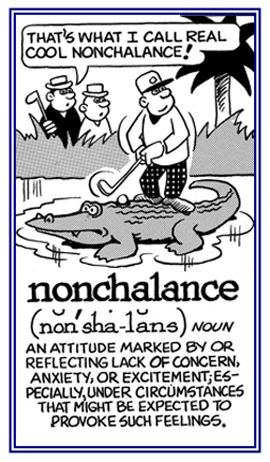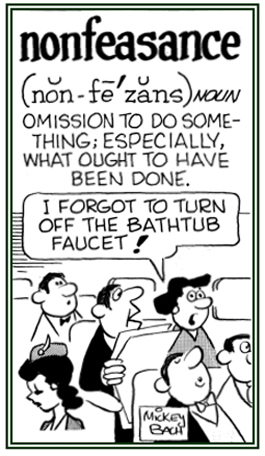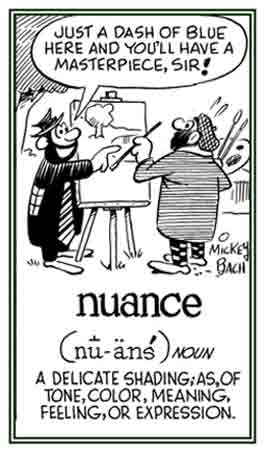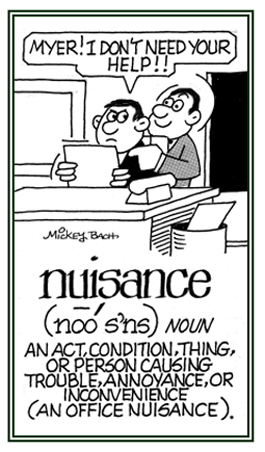-ance, -ancy
(Latin: often through French, quality or state of; being; condition; act or fact of _______ ing; a suffix that forms nouns)
neurofinance
nonacquaintance
Lacking acquaintance; the state of being unacquainted.
An attitude of indifference or lack of concern about what is happening; especially, in situations that normally would cause a great deal of anxiety: Jim was known for his nonchalance when climbing steep cliffs, while others avoided such adventures!

© ALL rights are reserved.
Go to this Word A Day Revisited Index

Go to this Word A Day Revisited Index
so you can see more of Mickey Bach's cartoons.
1. A failure to perform either an official duty or a legal requirement: Nonfeasance is the total omission of an agent to do a special assignment which he or she has agreed with a client to accomplish.
2. A neglect to do what someone ought to have done: Jack was guilty of nonfeasance when he forgot to tell Jill that he would not be home until much later because he still had to complete an assignment that day which was given to him by his supervisor at work.

© ALL rights are reserved.
Go to this Word A Day Revisited Index
2. A neglect to do what someone ought to have done: Jack was guilty of nonfeasance when he forgot to tell Jill that he would not be home until much later because he still had to complete an assignment that day which was given to him by his supervisor at work.

Go to this Word A Day Revisited Index
so you can see more of Mickey Bach's cartoons.
1. A very slight difference in meaning, feeling, tone, or color: The nuances in Rebecca's tone of voice while talking about her late husband conveyed a feeling of gloom and melancholy.
2. The use or awareness of subtle shades of meaning or feeling; especially, with references to artistic expressions or performances: The pianist performed the pieces with complete mastery of all of the nuances of the tones in the music.
3. A subtle deviation in meanings, opinions, or attitudes; hence, a slight degree of perceivable variations in anything apparent to the mind: The contrasts in the appearances of the twin boys was only detectable if given close attention; since there were only very slight nuances in details that revealed their individualities.
4. Etymology: from French nuance, "slight difference, shade of color" (so called with reference to the dissimilar colors of the clouds); from nuer, "to shade"; from nue, "cloud", from Gallo-Romance nuba; from Latin nubes, "cloud"; related to obnubere, "to veil".

© ALL rights are reserved.
Go to this Word A Day Revisited Index
2. The use or awareness of subtle shades of meaning or feeling; especially, with references to artistic expressions or performances: The pianist performed the pieces with complete mastery of all of the nuances of the tones in the music.
3. A subtle deviation in meanings, opinions, or attitudes; hence, a slight degree of perceivable variations in anything apparent to the mind: The contrasts in the appearances of the twin boys was only detectable if given close attention; since there were only very slight nuances in details that revealed their individualities.
4. Etymology: from French nuance, "slight difference, shade of color" (so called with reference to the dissimilar colors of the clouds); from nuer, "to shade"; from nue, "cloud", from Gallo-Romance nuba; from Latin nubes, "cloud"; related to obnubere, "to veil".

Go to this Word A Day Revisited Index
so you can see more of Mickey Bach's cartoons.
1. Something that annoys, gives trouble, or bothers people: When Bill and Karen went to the theater, it was a real nuisance for them to stand in line so long before they could get their tickets.
2. Anything which is offensive or noxious: John's wife was complaining that the noise from the electric fan was a real nuisance!

© ALL rights are reserved.
Go to this Word A Day Revisited Index
2. Anything which is offensive or noxious: John's wife was complaining that the noise from the electric fan was a real nuisance!
Too often, weather forecasts presented on TV, or the radio, become nuisances because they are wrong.
3. An annoying or irritating person, practice, or thing: The excessively talkative student was a nuisance for the teacher and the rest of the class.Ted considered all of the e-mails that he receives on his computer from unknown sources nothing more than nuisances; especially, those that claim he has become the beneficiary of thousands or millions of dollars!
4. Etymology: "injury, hurt, harm," from Anglo-French nusaunce, from Old French nuisance, from nuire, "to harm"; from Latin nocere, "to hurt".The sense has softened over time, to "anything obnoxious to a community" (bad smells, pests, eyesores), in about 1661, then it became a "source of annoyance, something personally disagreeable"; from about 1831. The application to people was from about 1695.

Go to this Word A Day Revisited Index
so you can see more of Mickey Bach's cartoons.
1. A bending down of the body, especially by bowing, expressing deep respect or deferential courtesy: In the fairy tale Anita was reading, the pauper showed her obeisance to the prince by curtsying and speaking carefully.
2. An attitude or behavior of someone who pays respect or homage to somebody or something: After entering the church, Agatha showed her obeisance and reference to Him by bowing and bending her knees.
2. An attitude or behavior of someone who pays respect or homage to somebody or something: After entering the church, Agatha showed her obeisance and reference to Him by bowing and bending her knees.
observance
The case of a person or of something being recalcitrant: Little Debbie was at the age of obstinancy, being totally resistant and defiant of what her parents wanted her to do or not to do!
The kilometres indicated on an aircraft's distance-measuring device: The omnidistance equipment on the plane shows the length of the gap between two places when interrogating and receiving responses from a transponder beacon.
oppugnancy
Opposition; resistance.
A regulation, a guideline, an edict, or a law determining how something should be done or controlled: There is a city ordinance regulating dogs in the parks by requiring them to wear muzzles to prevent them from snapping or biting people or getting into fights with other canines.
1. Equipment or supplies used by the military: During World War I, horses were considered a common ordnance for the army troops.
2. Etymology: "an authoritative direction, decree, or command"; from Medieval Latin ordinantia, from Latin ordinantem; present participle of ordinare, "to put in order".
2. Etymology: "an authoritative direction, decree, or command"; from Medieval Latin ordinantia, from Latin ordinantem; present participle of ordinare, "to put in order".
"In the early 14th century, it had changed to "arrangement in ranks or rows"; especially, "in order of battle"; also, "warlike provisions, equipment".
oscillance
An oscillation; a swinging back and forth.


